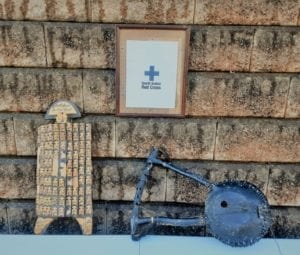Ahmed Elhag
Latham, New York, United States

When discussing the many challenges surrounding blood donation in South Sudan people tend to focus primarily on infrastructural barriers such as limited health care facilities and lack of investment and medical supplies. However, one important barrier that is often overlooked is the cultural stigma around blood donations. Many people in South Sudan falsely believe that giving blood will cause disease or even death. The World Health Organization acknowledged these challenges in South Sudan:
“. . . [W]idespread cultural challenges, especially beliefs and fears associated with blood donation, continue to deter enrollment. ‘Sharing blood is unnatural and will make you sick, and relatives often refuse to give blood to dying loved ones.’ These are some of the beliefs addressed through the drama and songs shared during the campaign. This calls for more community engagement to address the concerns and break these barriers.”1
When I read this article I began to remember things from my childhood in Sudan that made me realize how common such misconceptions really are. For example, I remember hearing a folk story as a child that carried this notion. According to the fable, long ago there was a boy and a girl who loved each other very much, but unfortunately, they belonged to two rival tribes. She was a Dinka and he was a Nuer. At the time, both tribes were involved in heavy feuding over grazing land and their families rejected any idea of them getting married. Heartbroken, the two lovers were separated. Months later, the boy heard news that the girl had fallen terribly ill, so he rushed to see her. When he saw her lying on her bed, he told her, “Because I cannot give you my heart, I will give you my blood.” He then took out a small blade, cut himself slightly, and used the blood to write a poem on her forehead. Miraculously, the girl was instantly healed, but the boy died soon after.
This tale is one of countless traditions that reflect the idea that giving blood will ultimately lead to one’s death. These traditional barriers have had drastic effects on the country’s blood supply, which was desperately needed when conflict broke out in 2013. Dr. Lul Lojok Deng, Director General of the Public Health Laboratory and National Blood Transfusion Services at the South Sudan Ministry of Health, stated:
“During the crisis in 2013, there was a lot of demand for blood. But there was no stockpile of blood back then, so many people died because of the lack of blood.”2
The situation became so dire that it seemed nearly impossible to reach the guidelines laid out by WHO, which stated, “1% of a country’s population needs to donate blood to meet annual requirements. Under this principle, South Sudan should be collecting an estimated 120,000 units for its population of about 12.9 million people.”3
However, in recent years with the help of humanitarian organizations like the Red Cross, my beloved homeland has begun to see a change for the better. The number of blood donors has risen dramatically over the years. In 2014 only about 23% percent of donated blood in South Sudan came from locals, but in 2018 that number rose to 35%.4 In 2018, there were 1,754 voluntary blood donations compared to five years before when the number was merely 65;5 and experts expect these numbers to rise even further. Many of these positive changes can be attributed to the awareness campaigns conducted by the South Sudan Red Cross and other similar organizations. The most famous of these arguably was in 2015, when South Sudan joined the rest of the world in the annual World Blood Donor Day. On one annual World Blood Donor day alone, more than 86 units of blood were collected in Juba in a single day.6 These awareness campaigns successfully challenged local misconceptions and changed the hearts and minds of thousands in Juba alone. The Red Cross in South Sudan has played a critical role in community mobilization. The success of the Red Cross and other organizations in promoting blood donation highlights the importance of awareness and education in any public health issue.
Seeing the awareness campaigns of the Red Cross/Red Crescent as a child in Sudan inspired me to pursue my dream to become a Health Education Specialist by receiving certification from the Ministry of Health in South Sudan. I hope to one day tackle more public health issues like vaccines and sanitation. I do believe, in the words of a true African hero:
“Education is the most powerful weapon which you can use to change the world.” —Nelson Mandela7
End notes
- “South Sudan Heightens Efforts to Increase Voluntary Blood Donation to Save Lives,” (n.d.) World Health Organization, accessed January 7, 2020, https://www.afro.who.int/news/south-sudan-heightens-efforts-increase-voluntary-blood-donation-save-lives)
- “Building a Blood Supply in South Sudan Means Breaking down Cultural and Structural Barriers.” (n.d.) World Health Organization. Accessed January 14, 2020. https://www.afro.who.int/pt/node/10946.
- Ibid
- Ibid
- Ibid.
- “World Blood Donor Day: South Sudan Registers More Voluntary Unpaid Blood Donors.” (n.d.) World Health Organization. Accessed January 12, 2020. https://www.afro.who.int/news/world-blood-donor-day-south-sudan-registers-more-voluntary-unpaid-blood-donors.
- “Nelson Mandela – Oxford Reference.” Nelson Mandela – Oxford Reference. Oxford University Press, March 14, 2018. https://www.oxfordreference.com/view/10.1093/acref/9780191843730.001.0001/q-oro-ed5-00007046.
AHMED ELHAG is a Sudanese student currently studying at SUNY Albany, where he is pursuing a career in Medical Laboratory Science. He became interested in this field at an early age and was inspired by the numerous awareness campaigns of the Red Cross/Red Crescent to become a public health educator. Ahmed aspires to become an NGO-educator to help tackle vaccination and sanitation issues in Sudan.

Leave a Reply